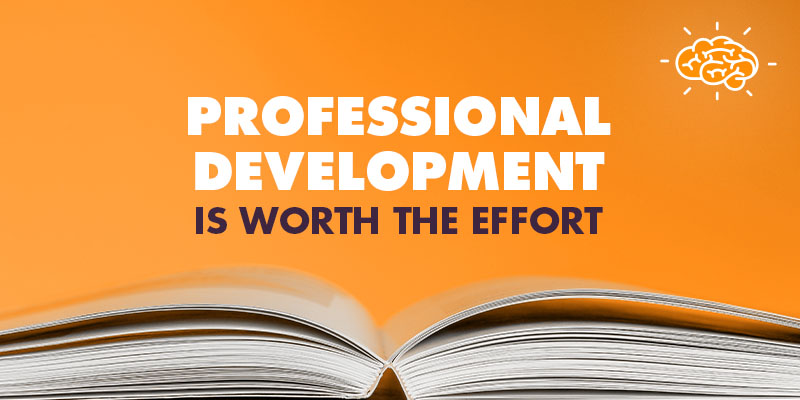I’ve long considered myself a lifelong learner. I’m passionate about constantly improving my skillset. I love the process and challenge of learning new things, and then figuring out how to apply them in various areas of my life. I get excited when I hear about a new conference, webinar or training I can participate in, because it either elevates my skills or puts me in touch with experts in the field.
I realize that not everyone is nerdy enough to read the local college continuing education pamphlet from front-to-back the second it arrives in the mail (totally something I do). But professional development – the act of learning new skills or expanding on your current skillset related to your job – is something that everyone should do. Here’s why.
Focus on Long-Term Goals
If professional development is new to you, start by planning out some long-term learning goals. This can look like reading a new book by an expert in your industry, enrolling in a free webinar to keep up with industry insights, or taking online certification courses. Many times, employers will pay for these because it brings value to the company. If time and budget are issues, consider chipping away at that learning goal over a couple years. Dedicate a certain amount of time to your learning each month. Maybe you already have a certification – great! But you’ll need to keep earning CEUs to maintain it. Check with your certifying organization – there’s almost always webinars or other online classes you can take for free or at low cost that can help you get those credits and put that long-term goal in your sights.
Learning and Networking at Conferences
Many times, when people think about professional development, they associate it with attending a conference. If the pandemic taught us anything, it’s that learning can happen in a variety of ways, and not necessarily in-person! Virtual conferences really took off in 2020. I had a great experience at two separate virtual conferences – one where I was a speaker, and one as an attendee. I was able to connect with experts in the field and I found it much easier to ask questions of the presenters in a virtual format than in-person. But there are also many benefits to attending a traditional conference. Networking is a big part of professional development for many people. Connecting with others, sharing about your business, and bringing new business to the table can all start with meeting people at conferences. Conferences also offer an opportunity to earn credits toward any certifications you might have or are working toward.
Even Experts Need Help
I’ve been a health coach for several years now, and something that always surprises my clients is that I have a coach as well. If I’m an “expert”, why would I need coaching? Well, the answer is that there’s always new things to learn and improve upon. Having other experts in your field help evaluate your skills or attending training classes to gain new perspectives on your work is a good best practice. Otherwise, you run the risk of falling into the “I already know everything there is to know” trap, and that’s not a good place to be. Things are constantly changing and innovating in nearly every field. It’s like my favorite quote from Einstein: “Learn from yesterday, live for today, hope for tomorrow. The important thing is not to stop questioning.” Don’t miss those opportunities for learning and expanding your horizons! They make you stronger and more marketable as a professional.
TVG offers a wide variety of training courses! Visit our website at www.tvgpr.com to learn about current offerings and how we can help take your team to the next level.
By Laura Vandiver, Senior Research Strategist and Health Coach at The Vandiver Group in St. Louis, Missouri
Follow The Vandiver Group on Facebook, Twitter, LinkedIn and Instagram. Read our other blogs here.

